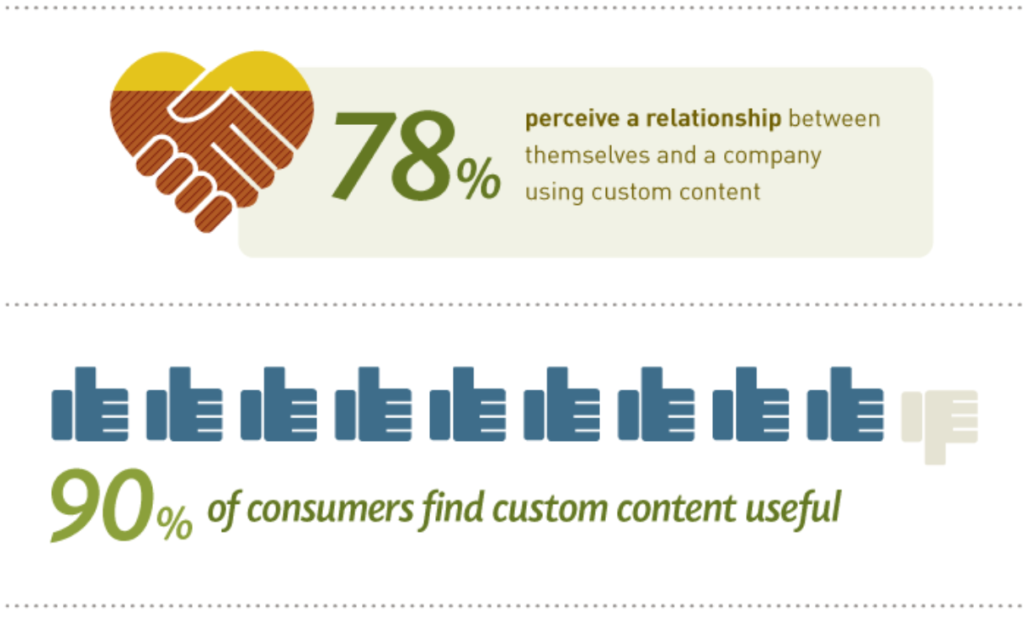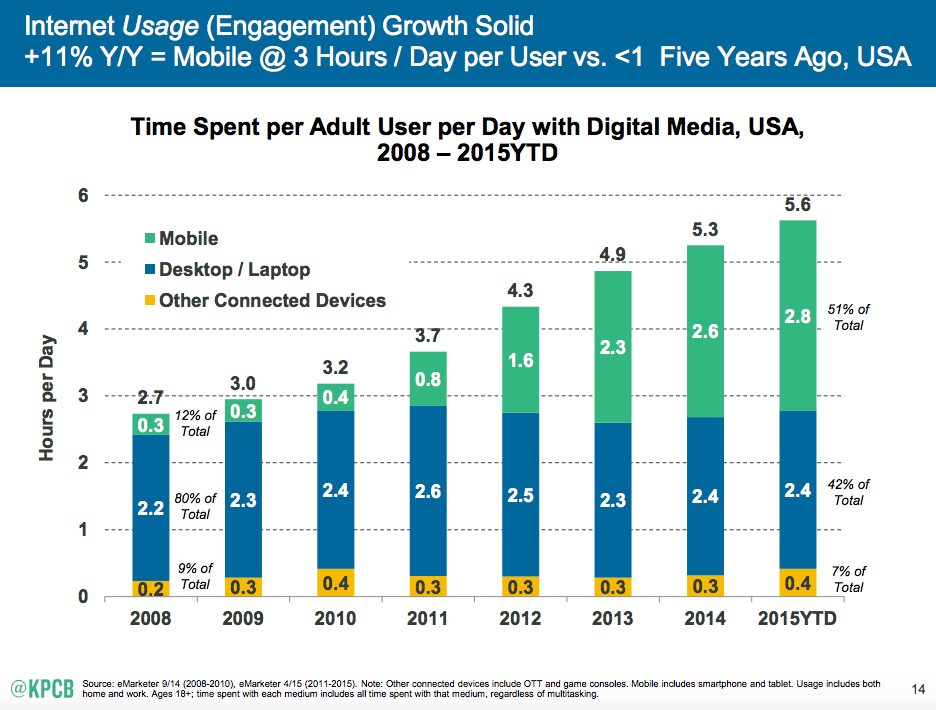Well, 2016 is in full swing now, and it looks to be an exciting year for content marketing.
While we’re still in the early days of the year – and while we’re all still writing ‘2015’ by accident on important documents – it’s interesting to look at some of the prophecies that marketing experts are making about the months to come.
Some marketers are making predictions that content marketing will continue to grow steadily yet surely, while adapting to new technologies that appear on the horizon.
Other marketers are predicting things that are just a little bit crazier…
It’s the wacky, out-there predictions that we’ll be looking at today.
These include:
- A rise in data-driven custom content,
- Mobile platforms overthrowing desktops,
- Companies buying platforms as an extension to content marketing,
- And some marketers who are rejecting content marketing entirely.
Obviously, some of these predictions contradict each other, indicating that there’s no clear, agreed-upon direction that content marketing will take in 2016.
So with that in mind, let’s go through some of the craziest predictions for this year. I’ll give my opinion on which ones make sense, and which ones are totally ridiculous.
1. Meaghan Moraes, Responsive Inbound Marketing (via Hubspot)
“Through meaningful customer relationships and conversations, companies create loyalists and brand advocates. Companies that do relationship marketing well set the bar high for other brands vying for more meaningful connections.
“So, how can companies develop community and personalize their outreach efforts? Data. We now have data in easily accessible and interpretable formats through which we can develop strong relationship-marketing plans. In 2016 and beyond, personalized, data-driven marketing will become increasingly important.
It’s already pretty clear that customers are looking for custom content, and that providing a personal unique experience can make a huge difference to content marketing efforts.
After all:
- 90% of customers feel that custom content is useful
- 78% of companies using custom content develop a stronger relationship with their customers.
Customers are looking for an online experience that’s perfectly tailored to them, and providing one will help develop a brand’s appeal.
But will this year be the year it takes off?
Marketers have had access to large streams of data about individual customers for many years now, thanks to two big sources:
- Social media
- Search engines
There are, of course, other sources of data for customer profiles in addition, but these are the big ones.
With access to so much information, though, companies often struggle to break it down into manageable chunks.
- The best way this data is put to use at the moment is through automated systems.
- Making better use of big data requires even more complex and intelligent automated filtering, analysis and implementation of data.
That’s why I feel that, before marketers can offer a truly unique, effecting custom content experience for users, the algorithms used to generate content need to become a lot more advanced.
It’s very possible that in 2016 will see these developments happen.
We already have the data: now all we need to do it figure out how to use it.
2. Joe Pulizzi, Content Marketing Institute
“This will finally be the year when large brands consider purchasing media platforms and begin to set up the infrastructure to make these purchases possible. Media acquisitions by brands will start in the B2B arena, where large manufacturers like GE will purchase niche content sites with loyal audiences (buy vs. build). This momentum will continue in 2017 when Apple will buy Disney, at last bringing together Steve Jobs’ two greatest creations (Apple and Pixar).”
While I’m not sure 2016 will see quite as much progress in this direction as Joe believes, I can’t fault his logic.
The logical next step for content marketing is acquiring dedicated platforms.
- Currently, companies looking to increase their brand power stand a lot to gain from big media outlets highlighting their products.
- This is why PR exists – companies push the media to report on their brands.
- Content marketing thrives on traffic generated from media platforms linking to a company’s website.
Imagine if, instead of simply hoping that a big name website writes a story about it, companies just bought the media outlet and encouraged it to post regular links to its content?
Doesn’t that sound more effective?
While Joe’s Apple-Disney buyout is pretty unlikely, businesses buying media platforms to promote their products is already very common.
- The Reuters news agency is one of the biggest examples of content marketing in the world: all of the news reports created by the company drive marketing campaigns for the company’s stock trading terminals.
- Mega company Sony bought Columbia Pictures, and goes out of its way to fill its movies with product placement for Sony electronics.
Of course, not all companies will be in a position to buy a media platform.
If Joe’s prediction comes true, it’ll be interesting to see how this will affect smaller companies and their content marketing efforts.
- Companies might be hesitant about sharing content produced by their competitors.
- They might start offering preferential treatment for content produced by companies willing to pay extra.
At the end of the day, though, even if media outlets are bought up by big companies, content will still be king.
No matter who owns a website, if your content is worth sharing, they’ll want to share it.
3. Jayson DeMers, AudienceBloom
“Mobile will completely dominate desktop. 2015 was a big year for mobile—not only did Google announce that mobile traffic finally overtook desktop traffic in 10 different countries, it was also the year they released the “Mobilegeddon” algorithm update to phase out sites not optimized for mobile. But apparently, you don’t have to have an optimized desktop site in addition to a mobile version—according to Google, a mobile-only site with no desktop counterpart is perfectly acceptable. This alone won’t be enough to drive down desktop traffic, but it’s clear what side of the fence Google’s on; they’re banking on desktop traffic fading away, meaning the smart money rests on mobile-focused online marketing.”
Mobile is an interesting area of development, and I definitely agree with Jayson that it’s likely to play a big role in 2016.
It’s definitely true that an increasing percentage of internet users are preferring mobile technology:
- The average American spends 158 minutes a day on their smartphone.
- 75% of Americans are so connected to their phones that they bring them with them into the bathroom.
- 51% of internet usage is done through a mobile, compared with only 42% on a desktop.
With an increase in users expecting a solid mobile experience, I think that search engines will probably increasingly focus on mobile as an indicator of quality.
- This means that content marketers will need to not only focus on the quality of their content, but the quality of the whole experience for mobile users.
- This means paying close attention to delivering a solid mobile architecture for the site.
Failing to make a website stand out on mobile can mean that even great content won’t get seen by the right people.
As far as I’m concerned, mobile is definitely going to be a big player this year – all content should be designed to be viewed on a variety of mobile screens, or else marketers risk alienating a large part of the market.
4. Sherice Jacob, iElectrify (via Kissmetrics)
“Google already displays videos in search results, but they’ve recently been experimenting with video ads as well. Other search engines, as well as other platforms like Facebook and Twitter, already leverage these types of ads in the form of auto-playing videos and Vines respectively – but at the moment Google is still testing the waters to determine how audiences respond to video-based ads.
“Assuming users are receptive of the idea, don’t be surprised to see apps also sharing a place at the SERPs table. Sure, we already have app directories and recommendations, but apps as part of search results will take these directories and stores to a whole new level.”
This is an interesting prediction, and one that content marketers should definitely pay attention to: if it bears true, it’ll mean big changes for the way search engines display different types of content.
So, according to Sherice:
- Search results will be increasingly tailored to a user’s personal mobile needs.
- Google will experiment further with mobile and vine ads, as well as apps and other types of content appearing in search results alongside web pages.
- The types of content which display well on a mobile may not always be text-based, meaning the need for more content type diversity to get the most out of typical internet users.
This all ties in with other predictions as to what will drive changes in online marketing throughout 2016:
- Big data into customers’ online habits
- The rise of the mobile platform
- Customer desires and needs.
In order to provide a more tailored experience for users, search engines will likely begin prioritizing various previously ignored types of content.
- This isn’t just about SEO – it’s a reflection of the added importance that all internet users will be placing on different content.
- Think of search engine changes as a reaction to, rather than the cause of, changes in internet user expectations.
With users seeking a wider variety of content from their internet usage, and expecting a custom experience tailored directly to them, it’s more important than ever to provide a diverse range of content types that take customer profiles into account.
5. Doug Kessler, Velocity Partners (via Marketing Insider Group)
“I expect a backlash against Content Marketing as some of the unsuccessful practitioners blame the approach instead of taking a good hard look at how they’re doing it. We’ll see the less committed jumping off the bandwagon and on to some other one. For the rest of us, that’s an opportunity.”
I think Doug might be onto something here.
Content marketing has been growing in popularity for years now, but it’s still very common to see companies going about it in completely the wrong way.
- 72% of marketers don’t have a consistent content marketing strategy in place.
There are all kinds of reasons why a company might struggle with their content marketing, for example:
- Failing to write a dedicated content marketing plan
- Failing to properly invest in content production
- Failing to pay proper attention to content distribution
As fantastic as content marketing is, a lot of companies end up missing out on the benefits it can offer.
They see the amazing results that other companies are producing, and wonder why they’re not able to generate the same while not properly investing the resources necessary to create and promote quality content.
So it’s completely plausible to me that 2016 might be the year when the less dedicated companies begin to give up.
- They’ll start arguing that content marketing doesn’t work after all (this is already happening to some extent).
- This will be a great opportunity for those who stick with it, as the market will become less crowded.
Of course, marketers still have to deal with the increasingly loud background noise of the internet, which will continue to distract users from the message they should be looking at.
For those who keep working at content marketing, though, there are huge gains to be had from persevering.
6. Ardath Albee, Marketing Interactions (via Marketing Insider Group)
“In 2016, B2B marketers will stop, take a breath and get to know their buyers before launching content marketing programs. With this knowledge they will create documented content marketing strategies that focus on building a progressive experience across the continuum of the buying process – using engagement scenarios to structure experiences that span channels where their buyers hang out.”
Ardath’s prediction pairs nicely with Doug Kessler’s suggestions:
- While some companies will be getting frustrated with content marketing and their failure to make it work for them, other companies will be looking to get the most out of their content.
- This means that the companies who will make the most of their opportunities in 2016 will be the ones who take the time to know their customers.
The idea of making use of customer data keeps appearing in 2016 predictions because this is an area of online marketing that’s not yet been fully exploited.
User data is available, but very few (if any) companies have found a way to sort through that data to find the best way to market directly to their customers.
- This may mean that the production of content might take a back seat for many companies, as they put the bulk of their efforts into understanding the data they have on their customers and how to produce content for them.
- Considering that personalized web experiences lead to a 20% increase in sales, it’s clear that many companies need to do more to find ways of making sure their content directly targets the right people in a way that will lead to engagement.
So what does this mean in practical terms?
Experimentation and adaption.
In 2016, it’s not going to be enough to produce the same content for everyone: marketers need to focus on unpacking the data on their customers to give each person unique content that matches their needs.
This will mean that the companies who want to get the most out of content marketing will need to experiment and try new things: we’re a long way away from perfect custom content at the moment.
7. Andy Crestodina, Orbit Media (via Social Media Examiner)
“Sometime in 2016, Twitter will create an algorithm that will affect which tweets are seen in which streams. Google has PageRank. Facebook has EdgeRank. Twitter will have TweetRank and it will prioritize ads. A year from now, your tweets won’t appear in the streams of all of your followers. Organic reach will be throttled, Facebook-style, but you’ll have plenty of options to boost the visibility for a small price.
“The social media world will quake at the change. Marketers and the news media alike will worry, wonder and wail. But when the dust settles, brands will find that spending a bit more on Twitter will be worth it. In the end, investors will cheer the reversal of Twitter’s financial fortunes.”
I can definitely see where Andy is coming from with this one.
In spite of its popularity, Twitter has never really turned into a big earner for its shareholders.
- Twitter’s user base growth has levelled off during 2015, and without new growth opportunities, it’ll be time for Twitter to monetize the platform as best they can.
- Like it or hate it, Facebook’s algorithms, which almost require spending to get content seen, mean that the company makes a lot of money from marketers.
- It’ll be difficult for Twitter to avoid similar opportunities as the platform continues to move forward.
So what will this mean for content marketing?
Currently, Twitter is useful to content marketers because it provides a quick and easy way to distribute content.
- 34% of marketers report that they regularly generate leads through Twitter.
With a more segmented user base, it’ll be interesting to see whether Twitter remains as useful for content marketers.
- With fewer followers seeing content, Twitter might become less helpful as a publishing tool.
- Other platforms such as Instagram, which continue to grow, may become more popular for marketers.
- Alternatively, it might just be easier to buy Twitter promotion and help an existing following to see your content.
Of course, it’s possible that Twitter won’t make the big changes that Andy predicts.
Even if the platform chooses to go in a different direction, though, 2016 will likely see:
- The continued stagnation of the Twitter user base.
- The growth of other social media platforms.
This means that marketers who want to make the best use of their publishing opportunities need to keep one ear to the ground about potential changes to all social media tools.
So, with all that in mind, what generalizations can we make about what we’ll see in 2016?
- Big data will make a difference in the way customers react to content.
- Changes to social media platforms and the way audiences receive content will occur.
- A greater need for further diversification of content types
- The rise of mobile, and a need to produce content for a smaller screen will impact all businesses.
- Companies will either go all-in on content marketing, or give it up for a different strategy.
It’s hard to say at this point which direction content marketing will take in 2016, and whether these predictions will come true.
While some might look outrageous on the surface, there’s an argument to be made for every point on this list – after all, these experts know their stuff.
One thing’s for certain: the changes that will occur this year will happen fast, and companies that fail to adapt to the new online marketing landscape will be left behind.
So don’t get left behind. Keep watching out for anything that could give your content the upper hand.
Good luck, and have a fantastic year.
Have another prediction about the changes we’ll see in 2016? Share your thoughts by leaving a comment below:
Images: Pixabay, Demand Metric, Flickr, Pixabay, , Smart Insights, Business Insider, Flickr, Flickr, Flickr, Flickr, Pixabay, Pixabay, Flickr.














